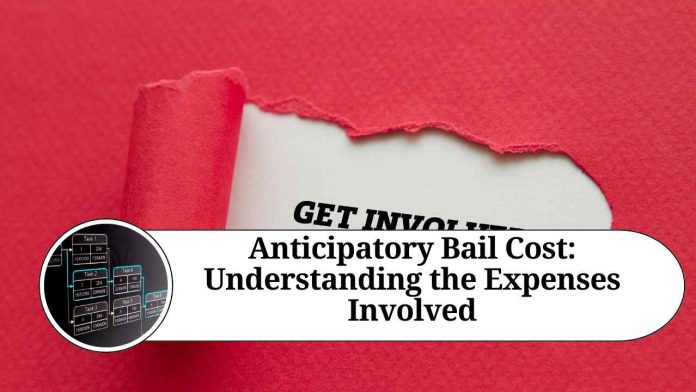Anticipatory bail is a legal remedy available to individuals who fear arrest in a criminal case. It allows the accused to apply for bail before they are actually arrested, thereby giving them the opportunity to avoid being taken into custody. However, like any legal process, applying for anticipatory bail also involves certain costs. In this blog, we will discuss the various expenses involved in seeking anticipatory bail.
Legal Fees The first and most significant cost involved in applying for anticipatory bail is the legal fees charged by the advocate. The fee charged by the advocate will depend on several factors such as their experience, the complexity of the case, the time involved, and the location of the court. Typically, advocates charge a retainer fee at the beginning of the case, which is a lump sum amount paid upfront. They may also charge an appearance fee for each court hearing.
Court Fees In addition to the legal fees, there are also court fees involved in seeking anticipatory bail. The court fees will vary depending on the state and the nature of the case. For instance, the fees for a criminal case will differ from that of a civil case. The court fees are usually payable at the time of filing the anticipatory bail application.
Miscellaneous Expenses Apart from the legal and court fees, there may be other expenses involved in the anticipatory bail process. These could include expenses related to obtaining documents and evidence required for the application, travel expenses for the advocate, and expenses related to serving notices and summonses to the parties involved in the case.
In some cases, the accused may also need to furnish a bond as a security deposit to secure their release on bail. The bond amount will depend on the severity of the offence and the discretion of the court.
conclusion
Seeking anticipatory bail involves certain costs, including legal fees, court fees, and other miscellaneous expenses. It is important to be aware of these expenses and budget accordingly. Additionally, it is crucial to choose a competent and experienced advocate who can guide you through the legal process and help you obtain the best possible outcome.
Other Related Blogs: Section 144B Income Tax Act
Frequently Asked Questions (FAQs)
Q: What is anticipatory bail?
A: Anticipatory bail is a legal remedy available to individuals who fear arrest in a criminal case. It allows the accused to apply for bail before they are actually arrested, thereby giving them the opportunity to avoid being taken into custody.
Q: What are the costs involved in seeking anticipatory bail?
A: The costs involved in seeking anticipatory bail include legal fees, court fees, and miscellaneous expenses such as expenses related to obtaining documents and evidence required for the application, travel expenses for the advocate, and expenses related to serving notices and summonses to the parties involved in the case.
Q: How much do advocates charge for anticipatory bail?
A: The fee charged by advocates for anticipatory bail will depend on several factors such as their experience, the complexity of the case, the time involved, and the location of the court. Typically, advocates charge a retainer fee at the beginning of the case, which is a lump sum amount paid upfront. They may also charge an appearance fee for each court hearing.
Q: What are court fees for anticipatory bail?
A: The court fees for anticipatory bail will vary depending on the state and the nature of the case. For instance, the fees for a criminal case will differ from that of a civil case. The court fees are usually payable at the time of filing the anticipatory bail application.
Q: Are there any other expenses involved in seeking anticipatory bail?
A: Apart from the legal and court fees, there may be other expenses involved in the anticipatory bail process. These could include expenses related to obtaining documents and evidence required for the application, travel expenses for the advocate, and expenses related to serving notices and summonses to the parties involved in the case.
Q: Do I need to furnish a bond for anticipatory bail?
A: In some cases, the accused may need to furnish a bond as a security deposit to secure their release on bail. The bond amount will depend on the severity of the offence and the discretion of the court.
Q: Can I negotiate the fees charged by advocates for anticipatory bail?
A: Yes, you can negotiate the fees charged by advocates for anticipatory bail. However, it is important to remember that the fees charged by advocates reflect their experience and expertise, and it is advisable to choose a competent and experienced advocate to handle your case, even if their fees are slightly higher than others.
Q: How can I budget for anticipatory bail costs?
A: To budget for anticipatory bail costs, it is advisable to consult with your advocate and get a clear understanding of the fees and expenses involved in the process. You can then create a budget based on this information and ensure that you have the necessary funds available to cover the costs.




















